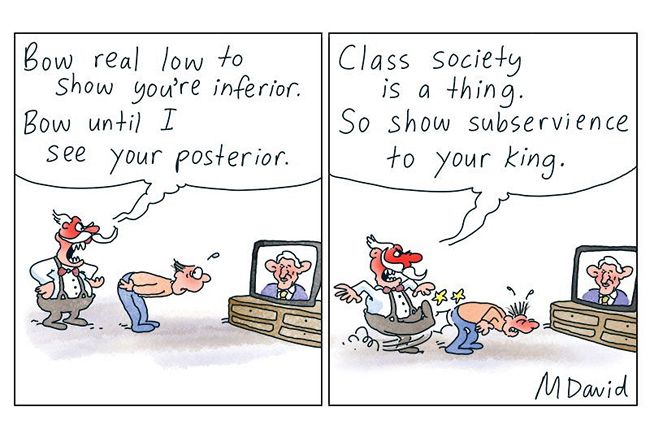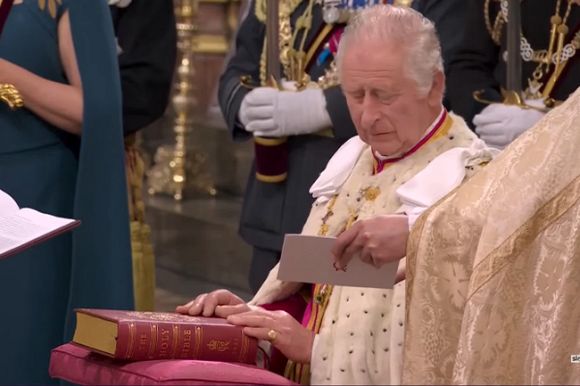The neo-mediaeval rituals carried out at Westminster Abbey contained warnings for democrats and republicans about the underlying power and which way the new King might want to go, writes Dr Lee Duffield.
THEY HAD A GREAT PARTY in London on 6 May, once again well managed like the 2000 Olympics or death of the Queen, with fairly understated great moments: putting the crown on his head, the precision marching, cheers of the genial crowds who waited through hours in the rain. It had lessons for events organisers worldwide: make sure you have a good starting budget, in this case, said to be well over $100 million, or have it all rehearsed to the point of moving in a dream.
With all the terrific spectacle and good humour, the meanings of it remained plain and explicit, as a consecration of power.
Early omens
Some of the indicators came in the lead-up when Charles III acceded to office.
In those ceremonies, he “agreed” to government ministers, in the United Kingdom but also in the overseas “realms” including Australia, being able to govern legitimately with his imprimatur.
The appointment of a UK government under the new Prime Minister, Rishi Sunak, was made by Charles, to rule “on his behalf”.
What indicators came up with the coronation?
The religious side of it stayed the same as after the mediaeval settlement, where the King got his share, being proclaimed the one true ruler in the sight of God and the Church retained its place as the legitimiser, anointing him with holy oil. It would be positioned as the moderator, always there to remind the King to be just — but how well has that ever worked?
As with the cavernous black-and-white scenes from the coronation in 1953, the sovereign would again spend most of the ceremony closely hemmed in and instructed by clergy. The Church made sure it was a religious event, especially with the predomination of religious music. And especially at the end, with a long recital including the hymn of the Church of England, with everybody by then impatiently waiting to get on with the parade, church bells ringing, cheering crowds, the marching, key players trundling along in the golden coach.
Assertion of power
On the political side, the assertion of power.
The configuration was to have a spot-lit King, with attendant wife, somewhat to be expected at a crowning, but with all other players made marginal, in many cases more so than before in history.
- Down with “Dukies and Duchesses” at last. William the Conqueror made a point of breaking up and dispersing the territories he handed out to his nobles, so he did not have to deal with powerful Duchies like those in Europe, having ruled one himself. This time was a further triumph of the monarchy over potential rivals in the “senior” nobility, the Dukes and Duchesses, who were told, according to the BBC commentators, not to wear their ceremonial ermine. The exception was for the tightest inner circle, members of the royal family who had team robes, most charmingly modelled by the Princess of Wales, Catherine, with the beautiful children, as heavily featured by the TV director.
- Down with the Aussies and colonials. No mention of Australia in the service this time. Day-after commentaries in England noted a de-emphasis of the Commonwealth, barring some symbolism. The Australian flag appeared a few times, the royal couple went to the abbey in a coach from Australia and diggers were in the march, although upstaged by the Mounties, very hard to beat in a parade.
- Down with multi-cultural, multi-faith. Admitting other faiths’ leaders to add statements, for the first time, meant they were not “out”, but did stay somewhat “down”, where their clergy had the smallest appearances. Multi-cultural and inclusive Britain had its manifestations, as with some of the Anglicans’ female clergy engaged in the Eucharist, or Black faces here and there, or the South Asian background of the Prime Minister — but check the visuals to see where the numbers mostly lay.
- Down with trouble-makers, elephants in the room, ghosts of scandals past. Prince Andrew had to be much in the background (unsurprising in view of the sexual abuse charges levelled against him in America); Prince Harry was seated rows-back, on his own; no Meghan, no Diana for that matter.
Republican troublemakers
But the troublemakers of more concern were the hundreds of anti-monarchists who set up protests at Trafalgar Square and elsewhere, shouting “Not my King”. These got into the television news though not identified in the official television feeds from the street processions. One hundred were arrested by police under toughened anti-protest laws, applicable to anti-royal activities and “direct action” on issues like animal rights, recently introduced by the Government and signed into law by Charles.
Prince Charles, it cannot be forgotten, exchanged correspondence and words of encouragement with the former Governor-General, Sir John Kerr, as the latter was preparing to terminate the elected government of Gough Whitlam. It remains undisclosed whether he referred any of this to his late “Mama”; hopefully not, as she was so widely respected as an honest and mature person.
He might seek to be excused, on the grounds of having been young and stupid in 1975 — plausible if he has not remained stupid. He presented as a buffoonish prince, to emerge as a kindly man, a true environmentalist determined to help save the Earth, a sensible advocate for classical principles in architecture, gifted with a sense of humour.
An anti-democratic impulse
The problem with him in 1975, and even in the present episode, has been that it shows up an anti-democratic impulse and an assumption that the key decision-making should be done by the likes of himself, by anointed royalty and their direct representatives, not by the public and our elected representatives. Heavy penalties for criticising a head of state are common in any number of authoritarian states or banana republics, but does it have a place in democratic Britain? And do we want an insecure figure of that kind, who must be so unctuously protected, as head of state of Australia?
Since the coronation event was styled after and redolent of very old conflicts and settlements, it is appropriate to put any apprehended misdeeds by this Charles, any transgressions against democratic government, in a historical context.
Outstandingly, there is the case of his namesake, Charles I, who took the language of the coronation, about being anointed by God, entirely literally. He got up an armed insurrection to remove and displace the new parliamentary government, but was defeated and executed.
Sentiments attributed to that Charles, indicate that he professed the greatest love for “his” people, but as for their government, it was not their concern:
The people's liberties strengthen the king's prerogative and the king's prerogative is to defend the people's liberties.
Democracy is the power of equal votes for unequal minds.
Just 127 years after that man’s death (30 January 1649), the United States declared independence (4 July 1776) and the English King of the time, George III, objected on much the same grounds of entitlement. The young Charles Windsor is known to have made a study of George his progenitor. He would be aware that the Americans’ grievance was that they wanted democracy and when George took them on, again using armed force, he got a historical, massive and argument-settling kick in the backside.
Anthony Albanese, the Prime Minister, has invited Charles III to visit Australia. Actually, he can travel to Australia by right to visit “his” country; but thinking of George III, he should remember to watch himself if he does.
Among his vast journalistic experience, Dr Lee Duffield has served as ABC's European correspondent. He is also an esteemed academic. He is a member of the Editorial Advisory Board of Pacific Journalism Review.
Related Articles
- King's coronation was theatre with bad actors
- CARTOONS: Mark David is bending the knee
- King Charles III — defender of the Islamic faith
 This work is licensed under a Creative Commons Attribution-NonCommercial-NoDerivs 3.0 Australia License
This work is licensed under a Creative Commons Attribution-NonCommercial-NoDerivs 3.0 Australia License
Support independent journalism Subscribe to IA.















